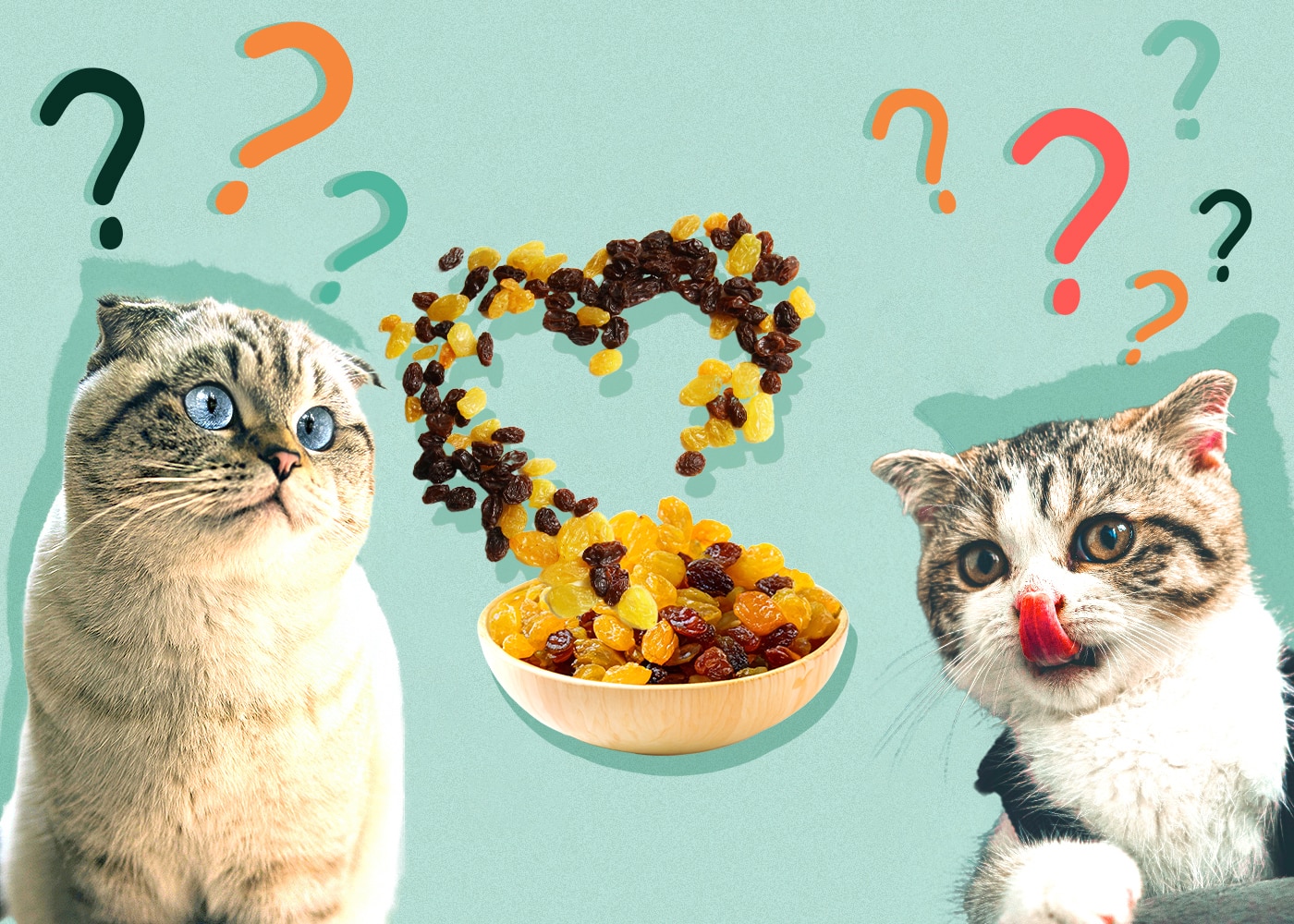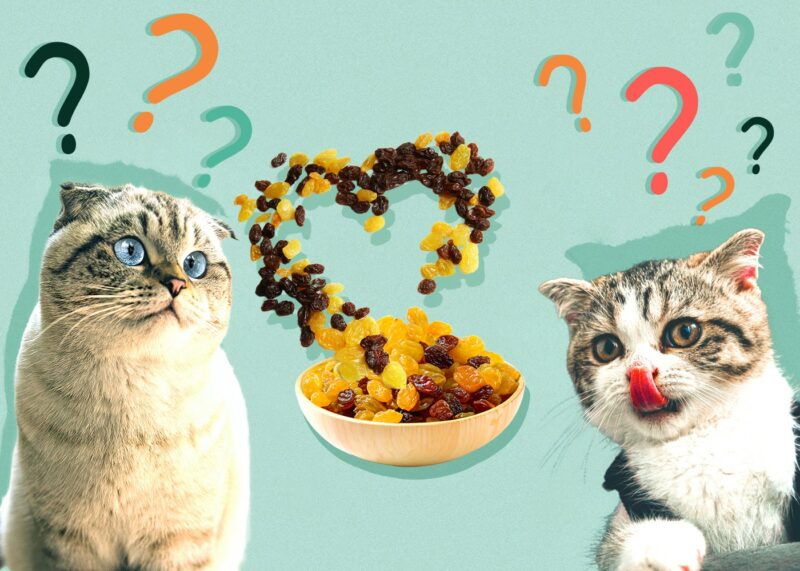Click to Skip Ahead
Having a cat in your home is a never-ending adventure. One minute a kitty can be the friendliest creature in the world. The next? Well, any cat lover knows every kitty out there exhibits some degree of cattitude at some point in their lives. Cats are also great adventurers. They make a home theirs and spend most of the day exploring.
When this happens, they often find things to get into that they shouldn’t. This includes foods to eat that can be dangerous. One of the foods that many pet owners love that are toxic to cats is raisins. While you may not think much about having a cookie or pack of raisins, offering your kitty to share this treat can be toxic to them. Let’s learn more about why your cat shouldn’t eat this treat and ways you can enjoy raisins without worrying about harming your feline friend.
Cats and Raisins
As we’ve already discussed, cats are notorious adventurers. The idea of them getting into something in the kitchen isn’t unheard of. If you’re a fan of raisins or foods that include raisins, this leaves you needing to make sure these treats are safely put away so your cat can’t find them. But why are raisins bad for your cat? To be honest, no one knows and scientists are still working to find out the toxicity mechanism. Recent research suggests tartaric acid may have something to do with it. The same is true for all grape products. Raisins are made by drying out grapes. What is known about raisins and cats, is what they can do to your pet when your kitty accidentally eats them. This is called raisin poisoning.
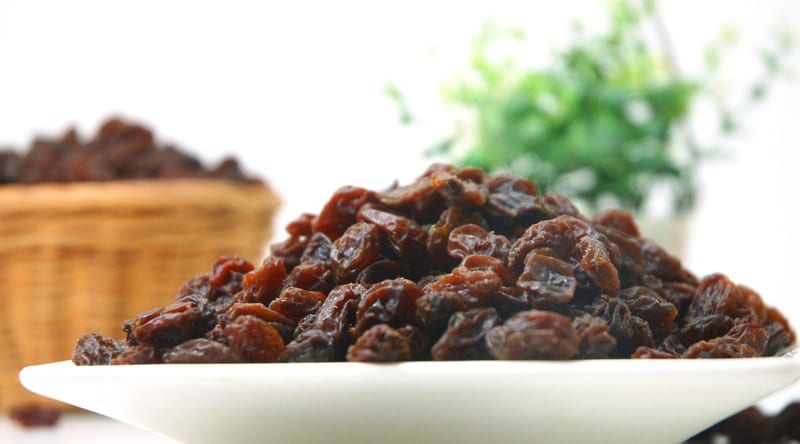
What Is Raisin Poisoning in Cats?
While the reasons raisins are dangerous to cats are unknown, there are serious signs of raisin poisoning in cats that veterinarians have established. Ultimately raisin ingestion in some cats can cause kidney failure. It does not happen in every cat and the toxic dose is not known. As far as raisins, grapes or grape juice are concerned any amount should trigger a call and visit to your veterinarian urgently.
Here’s a look at the signs of raisin toxicity in cats that you should be aware of if you enjoy raisins or foods with raisins in them.
- Diarrhea
- Vomiting
- Weakness
- Lethargy
- Loss of appetite
- Pain in the abdomen
- Frequent urination (possible sign of kidney failure)
- Unable to produce urine (if kidney failure occurs)
Considering that raisin poisoning in cats can be fatal, please make sure you take your cat to the veterinarian immediately if you see your cat eating raisins.

Protecting Your Cat from Raisin Poisoning
Now that you know just how dangerous raisins can be for your cat, let’s learn more about how you can protect your pet from the risks. Fortunately, if you’re a lover of raisins or foods made with raisins, there’s no need to cut them out of your life completely. You can safely enjoy raisins and keep your cat safe at the same time. This is especially true since cats are obligate carnivores and get all their needed nutrients from the meat they eat.
1. Proper Storage
While raisins aren’t the only foods in your kitchen that can be dangerous to cats, they are one of the easiest to overlook. Raisins can be in lots of foods. Even those you wouldn’t expect. This is why proper storage is so important. Whether it’s snack cakes with raisins in them or boxes of these treats, you should store your raisins in an airtight container. Cats are notorious for getting into things they shouldn’t. Using a proper storage container will limit the possibility of raisin poisoning.
2. Be On Alert When Eating Raisins Around Your Cat
You can always avoid eating raisins around your cat period. However, if you simply can’t stay away from these tasty little morsels, be particularly careful when enjoying them in a home where a cat lives. Raisins are small and can be dropped easily. With cats being so observant, the idea of a kitty pouncing on a fallen raisin is expected. By limiting your consumption or being on high alert when eating raisins, you can spare your cat’s pain.
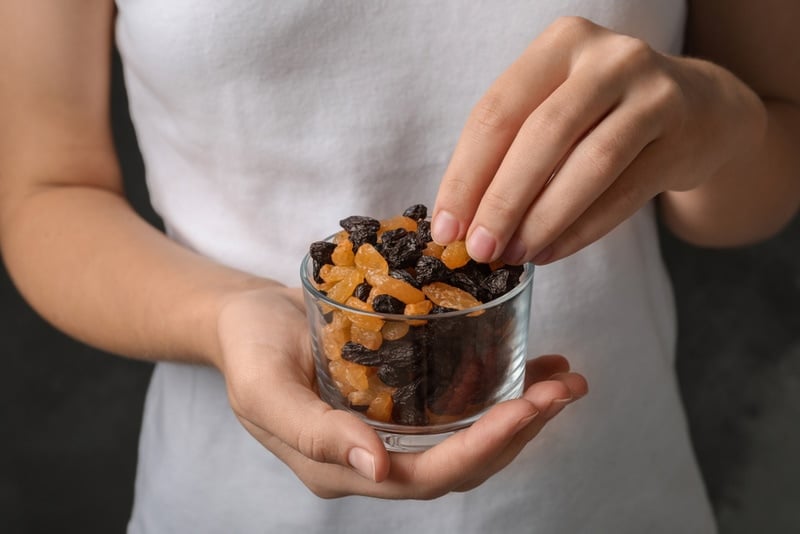
3. Have Alternate Snack On Hand
When it’s snack time and raisins are the answer, it helps if you have snacks ready for your cat to enjoy as well. This will help keep your kitty from trying to snag one of your raisins. Of course, meat is always going to be at the top of the list when it comes to favorite treats for cats. However, other tasty treats are healthy and safe for your cat to enjoy. Here’s a look at a few things you can share with your kitty while you eat a few raisins.
- Small portion of cold cuts of plain cooked meat
- Dental treats
- Weight loss treats
What If My Cat Accidentally Eats Raisins?
No matter how careful you are, there’s always a chance that your cat could accidentally eat raisins. The big question is, what should you do if this happens? The first step is to contact your veterinarian. They will need important information such as how many raisins the cat has ingested and how long ago it took place. Catching this early is the best way to minimize the damage done to your kitty.
Treatment
There is no antidote for grape or raisin poisoning. Instead, the veterinarian may decontaminate your cat’s stomach by inducing vomiting. This is not something you should try to do at home. The veterinarian is the only one who should attempt to remove the toxins from your cat’s stomach. Your cat may also be given activated charcoal to help absorb any leftover toxins inside the stomach.
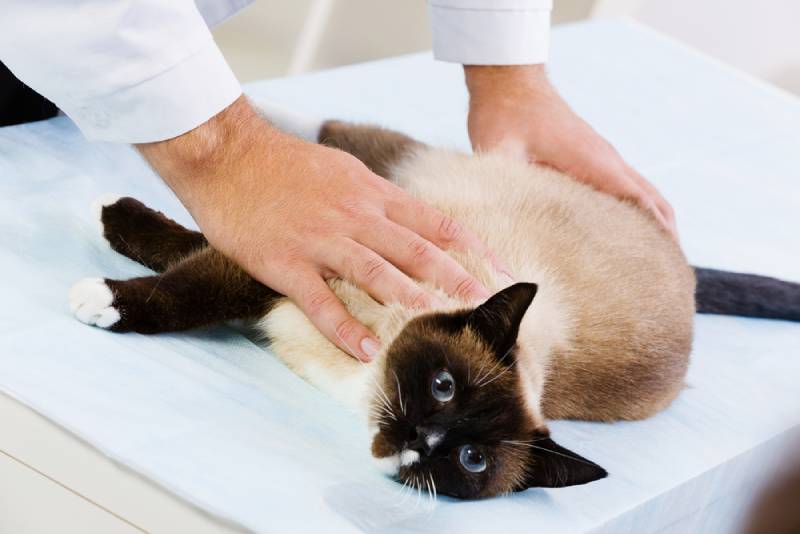
Severe Cases
If a cat reacts badly to the ingested raisins, kidney failure can occur. In these cases, your cat will most likely need to spend a bit of time in the hospital. IV fluids are often used during this time to help promote healthy kidney function and flush toxins out of the system. Blood tests will also be done for a few days to help the veterinarian keep an eye on any potential damage to your cat’s kidneys. If damage is there, your cat could be kept by the veterinarian longer for further treatment.
Final Thoughts
As you can see, allowing your cat to eat raisins can be quite dangerous for them. Instead, you should be extremely careful when enjoying raisins or snacks including raisins. Make sure your snacks are kept safely stored and that your cat is only given treats that are safe for them to enjoy. If an accident occurs, reach out to your veterinarian immediately for assistance to help keep your cat healthy.
Featured Image Credit: Cheese78, Shutterstock

